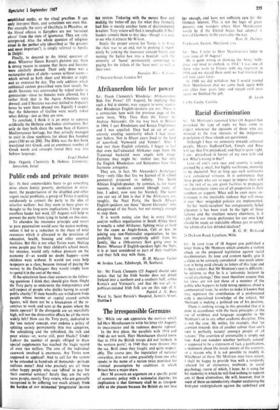Sir: I think that Simon Raven (18 August) greatly exaggerates
the difference between Jesus and Socrates,- and this he manages to do by ignoring the limitation of 'reasoning' according to Socrates.
First, according to Socrates (in the Republic), the dialectical approach is to be limited only to the 'Guardians.' The common people are to be deceived by 'royal lies' and myths, which are to be believed authoritatively. I should say that Jesus's parables are on a much higher level, since they are obviously sincere.
Second, even the educated audience, after the 'reasoning' is finished, is subjected to a myth which is given as a higher truth. Is the myth of Er (in the Republic) so different from the Book of Revela- tion? I think not. The same can be said about the myth in Gorgias or in Phaedo, which come.vinutte- diattly. before the death of Socrates. -+,- Third, reason is not allowed to doubt either the
established myths, or the ritual practices. It can tidy interpret them, and sometimes not even this. For example the story of Oreithyia in Phaedrus, or the blood offence in Eatyphro are not 'reasoned about' from the state of ignorance. They are only interpreted. Also the whole question of religious ritual in the perfect city (described as 'the greatest and most important'), is simply referred to Apollo in Delphi. Finally, to descend to the trivial question of dress. Whatever Simon Raven's pictures say, there is strong reason to assume that Jesus and Socrates were similarly dressed. Their only dress was a rectangular piece of cloth—woven without seams— which served as both sheet and blanket at night. and an overcoat by day. The only addition which rabbinical custom prescribed were four tassels. No doubt Socrates was surrounded by naked males in gymnasium—since no females were allowed, but I rather think that in the Agora Athenians went dressed, and if Socrates was ever invited to Aspasia's home he went there dressed too. Equally I suspect that the fishermen of Galilee were nearly naked when fishing—just as they are now.
To conclude, I think it is an error to separate artificially the Hellenic and Judaic civilisations. Not only do they both share the same base of Eastern Mediterranean heritage, but they actually managed to exist in close symbiosis for about five hundred years• (300 BC-AD 200). The Bible was the first book translated into Greek, and an enormous number of Greek words and concepts found their way into hebrew language.
Israel Shahak Dep. Organic Chemistry B, Hebrew University. Jerusalem, Israel































 Previous page
Previous page